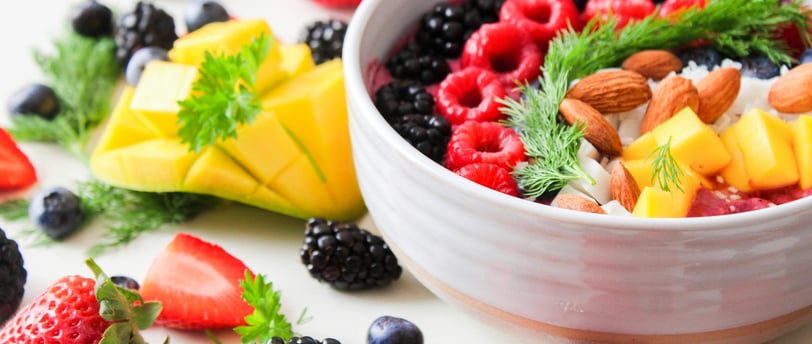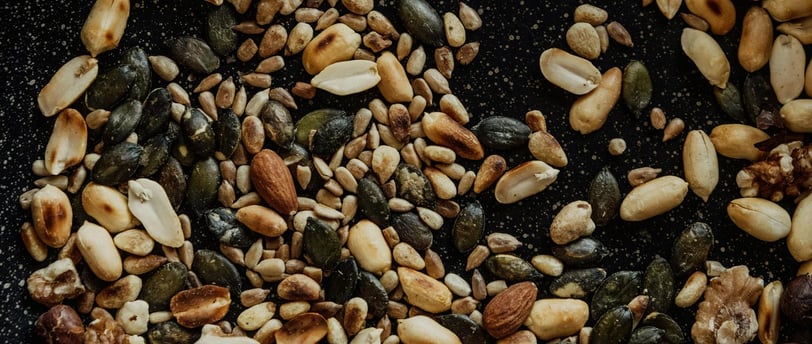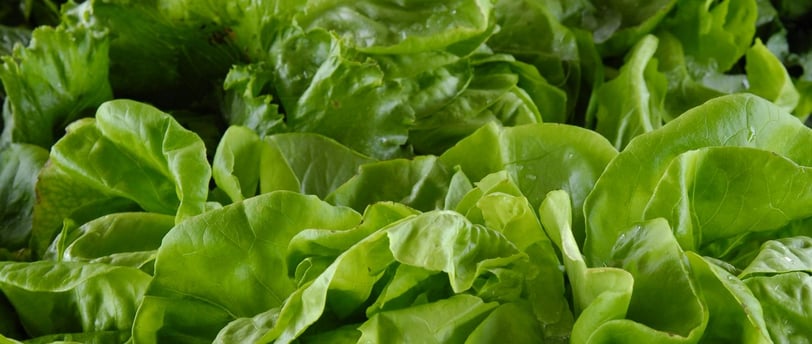Superfoods for Women and Healthy Aging
Discover the best superfoods for women that promote healthy aging. Learn how to enhance women's health with a nutritious diet tailored for aging gracefully.
FOOD
Her Next Chapter
1/13/20259 min read


Introduction to Healthy Aging and Superfoods
Healthy ageing is a multifaceted process that encompasses not only the physical aspects of growing older but also mental, emotional, and social well-being. For women, the journey through various life stages—such as menopause and post-menopause—brings unique challenges that require heightened attention to health and wellness. Nutrition plays a pivotal role in this holistic approach to ageing. As women age, their bodies undergo significant changes, and maintaining a balanced diet becomes essential for enhancing vitality, managing weight, and reducing the risk of chronic diseases.
Superfoods are nutrient-rich foods that offer substantial health benefits, making them an integral component of a diet aimed at promoting healthy ageing. These foods are celebrated not just for their high levels of vitamins and minerals but also for their antioxidants, fibre, and other bioactive compounds that can combat inflammation, support immune function, and improve heart health. By incorporating superfoods into daily meals, women can strengthen their bodies against age-related issues such as osteoporosis, cardiovascular diseases, and cognitive decline.
Furthermore, many superfoods possess properties that can help maintain skin elasticity and hydration, thereby contributing to a more youthful appearance. Foods like berries, leafy greens, nuts, and whole grains are packed with nutrients known to support brain health, improve digestion, and stabilize blood sugar levels. As awareness regarding the link between nutrition and healthy ageing grows, women are increasingly receptive to integrating these powerful foods into their diets. By understanding the vital role that superfoods play, women can take proactive steps toward not only extending their lifespan but also enhancing their quality of life as they age.
The Importance of Nutrition in Aging
As women progress through various stages of life, the significance of proper nutrition becomes increasingly vital to maintaining health and vitality. Ageing can bring about a range of physiological changes that affect nutritional needs, requiring a focused approach to dietary habits. Incorporating essential vitamins and minerals is crucial for promoting overall well-being and preventing age-related health issues.
Vital nutrients, such as calcium and vitamin D, play a critical role in bone health, helping to stave off osteoporosis—a common concern among older women. Additionally, adequate intake of vitamin B12 supports cognitive function and energy levels, both of which may decline with age. Omega-3 fatty acids are another important component of a healthy diet, associated with reduced inflammation and a lowered risk of chronic diseases such as heart disease and arthritis.
The connection between diet and chronic diseases cannot be overstated. Evidence suggests that a diet rich in fruits, vegetables, whole grains, and lean proteins can help mitigate risks associated with conditions like diabetes, hypertension, and certain types of cancer. Such dietary patterns not only support physical health but also promote mental well-being, enhancing mood and cognitive function.
Furthermore, as metabolism slows down with age, women may require fewer calories but must be conscious of nutrient density. This means selecting foods that provide the maximum amount of nutrients per calorie, ensuring all essential vitamins and minerals are consumed without excessive caloric intake.
Incorporating a variety of foods into the diet can lead to more balanced nutrition. Superfoods—rich in antioxidants, vitamins, and minerals—can be particularly beneficial. These foods can help combat oxidative stress, support immune function, and improve overall health outcomes. By prioritizing nutrition, women can embark on a path toward healthy ageing, ultimately enhancing their quality of life as they navigate their later years.
Superfood #1: Berries
Berries, particularly blueberries, strawberries, and raspberries, have gained recognition as superfoods due to their exceptional nutrient profiles and health benefits. These fruits are rich in antioxidants, which play a crucial role in combating oxidative stress in the body. Research indicates that antioxidants can help mitigate the effects of ageing, supporting cellular health and reducing the risk of chronic diseases.
Blueberries, often touted as a nutritional powerhouse, are particularly high in anthocyanins, a type of antioxidant associated with improved brain health. Studies have shown that regular consumption of blueberries may enhance cognitive function and slow down age-related decline. For instance, a study published in the journal "Frontiers in Aging Neuroscience" demonstrated that older adults who consumed blueberries experienced improvements in memory and cognitive performance due to the neuroprotective properties of these fruits.
Strawberries also contribute to healthy ageing by being a rich source of vitamin C and polyphenols. These compounds have been linked to reduced inflammation, a critical factor in many age-related health issues. A study highlighted in the "Nutrients" journal showed that regular strawberry consumption could lead to lower levels of inflammatory markers, suggesting a protective effect against cardiovascular diseases. Additionally, strawberries are beneficial for skin health, given their role in collagen synthesis.
Raspberries, another berry variety, are packed with fibre and essential vitamins, including vitamin K and manganese. Incorporating raspberries into one’s diet can aid in digestion and support gut health. Furthermore, their anti-inflammatory properties can help in reducing the risk of inflammatory-related diseases as one age.
Incorporating a variety of berries into a balanced diet is an excellent strategy for women looking to promote healthy ageing The unique combination of vitamins, antioxidants, and anti-inflammatory compounds in these superfoods offers substantial benefits, making them a wise choice for enhancing overall well-being.
Superfood #2: Leafy Greens
Leafy greens, such as kale, spinach, and Swiss chard, play a significant role in promoting healthy ageing, particularly for women. These vibrant vegetables are not only low in calories but are also packed with essential nutrients that contribute to overall health. They are an excellent source of vitamins A, C, and K, which are vital for various bodily functions. For instance, vitamin A supports eye health, while vitamin C functions as a powerful antioxidant that helps protect cells from damage. Additionally, vitamin K is crucial for bone health, aiding in calcium absorption and promoting bone density, which is particularly important for women as they age.
Moreover, the mineral content in leafy greens is noteworthy. They are rich in calcium and iron—two minerals vital for maintaining heart health and preventing anaemia, respectively. Calcium supports cardiovascular health by regulating blood pressure, while iron is essential for transporting oxygen throughout the body. This nutrient profile makes leafy greens a strategic choice for women striving for optimal health as they enter their later years.
Beyond their nutritional advantages, leafy greens have been linked to enhanced cognitive function. Studies suggest that a diet rich in vegetables may help slow cognitive decline, which is crucial as women age and become more susceptible to memory-related issues. Incorporating these greens into one’s diet can be achieved in various ways, such as in salads, smoothies, or sautéed as a side dish, making them versatile additions to any meal plan.
In essence, leafy greens serve as an indispensable superfood for women looking to age gracefully. Their rich nutrient profile supports heart health, bone density, and cognitive function, making them a powerful ally in the journey of healthy ageing.
Superfood #3: Fatty Fish
Fatty fish, including varieties such as salmon, mackerel, and sardines, are widely recognized as a superfood, particularly due to their high content of omega-3 fatty acids. These essential fats are crucial for numerous bodily functions, making them particularly important for women, especially as they age. Omega-3 fatty acids play a pivotal role in maintaining heart health by helping to lower triglyceride levels, reduce blood pressure, and prevent the formation of blood clots. Furthermore, they exhibit anti-inflammatory properties, which can alleviate chronic inflammation often linked to various health issues.
In addition to heart health, omega-3 fatty acids have garnered attention for their potential neuroprotective benefits. Some studies suggest that regular consumption of fatty fish may reduce the risk of cognitive decline and conditions such as Alzheimer's disease. This is particularly pertinent for women, who tend to live longer than men and may be at a greater risk for such age-related cognitive issues. Including fatty fish in one's diet could be a proactive measure for promoting brain health and safeguarding cognitive function.
For those looking to integrate fatty fish into their meals, there are many adaptable serving suggestions. Grilling, baking, or pan-searing are excellent cooking methods that preserve the fish's nutrients. Incorporating fatty fish into salads, pasta dishes, or as a standalone entree can provide delicious and healthful options. Common recipes might include baked salmon with herbs, mackerel fillets in a lemon-dill sauce, or sardines on whole-grain toast. With the various cooking methods and flavour profiles available, adding fatty fish to your diet can be a delightful and nutritious addition, enriching not only your meals but also your overall health.
Superfood #4: Nuts and Seeds
Nuts and seeds are among the most nutritious foods available, offering a myriad of health benefits particularly beneficial for women as they age. Walnuts, flaxseeds, and chia seeds stand out due to their impressive nutrient profiles, and high levels of healthy fats, protein, and dietary fibre. These attributes support overall well-being and play a significant role in healthy ageing.
Walnuts, for instance, are rich in omega-3 fatty acids, which have been linked to improved heart health and reduced inflammation. Their high antioxidant content also contributes to better cognitive function, a vital factor as individuals age. Including a handful of walnuts in your daily diet can enhance satiety, helping to maintain a healthy weight and promote better digestion.
Flaxseeds and chia seeds are equally noteworthy. Flaxseeds provide lignans, a type of phytoestrogen that may help balance hormone levels in women, thus alleviating some menopause-related symptoms. Meanwhile, chia seeds are an excellent source of omega-3 fatty acids, protein, and fibre, making them particularly effective for heart health and skin elasticity. The fibre content in both seeds aids digestion and helps maintain a feeling of fullness, which can prevent overeating.
Incorporating these superfoods into your diet can be easy and enjoyable. Consider adding walnuts to oatmeal, integrating flaxseeds into smoothies, or sprinkling chia seeds over salads or yoghurt. These small adjustments can significantly enhance your nutrient intake and contribute to a healthier lifestyle. Overall, nuts and seeds not only offer essential nutrients but also provide delicious flavour and texture, making them a valuable addition to any meal plan for women focused on healthy ageing.
Superfood #5: Avocado
Avocado has rightfully earned its designation as a superfood, particularly in the context of healthy ageing for women. This nutrient-dense fruit is packed with healthy monounsaturated fats, which are essential for maintaining cardiovascular health. These good fats help lower bad cholesterol levels, thereby reducing the risk of heart disease, a condition that becomes increasingly important to monitor as women age. In addition to its heart-healthy properties, avocados contain potassium, an essential mineral that aids in muscle function and blood pressure regulation, further contributing to overall health.
Another significant benefit of avocados is their high fibre content. Dietary fibre plays a critical role in digestive health and aids in weight management, which is vital as metabolism may slow with age. By incorporating avocados into the diet, women can enjoy a satisfying and nutritious option that promotes satiety, thereby aiding in the prevention of overeating.
Beyond its health advantages, avocado is incredibly versatile in culinary applications. Its creamy texture and mild flavor make it a delightful addition to salads, smoothies, and even baked goods. Avocados can be smashed on whole-grain toast, used as a spread, or incorporated into guacamole to create a delicious dip rich in nutrients. Furthermore, adding avocado slices to meals increases the absorption of fat-soluble vitamins, making it an excellent companion for a variety of produce.
In summary, incorporating avocado into a balanced diet can contribute to heart health, support skin vitality, and assist with weight management. As such, this superfood is a valuable ally in the journey towards healthy ageing for women, enhancing both nutritional intake and culinary enjoyment.
Conclusion: Embracing a Superfood-Enriched Diet
As women navigate the journey of ageing, integrating superfoods into their daily meals presents a valuable opportunity to enhance overall health and vitality. The term "superfoods" refers to nutrient-dense foods that provide exceptional health benefits, significantly contributing to the body's resilience against age-related challenges. By embracing a diet rich in superfoods, women can support their physical and mental well-being, encourage healthier skin, and maintain energy levels.
Throughout the exploration of 10 superfoods, it has become clear that individuals have abundant choices to include in their meals. From berries that are rich in antioxidants to leafy greens that provide essential vitamins, each superfood plays a unique role. Women should experiment with these options, incorporating them into everyday meals, snacks, or smoothies to create a balanced and nutritious diet. The versatility of superfoods allows for delightful culinary creativity, bringing not only health benefits but also enjoyment to the eating experience.
Making informed dietary choices is crucial; women should aim to create a vibrant and diverse plate that incorporates these superfoods. This approach fosters not only physical health but also emotional satisfaction associated with consuming wholesome, beneficial foods. Additionally, as women learn about these nutritional powerhouses, they are empowered to understand how these foods can work synergistically to support their health goals.
In conclusion, embracing a superfood-enriched diet is not just about achieving specific health outcomes but represents a comprehensive approach to healthy ageing. Women are encouraged to explore additional resources, seek out delicious recipes, and share their experiences with superfoods, cultivating a community focused on sustainable, healthful living as they age gracefully.










hernextchapter50@gmail.com
© 2025 Her Next Chapter. All rights reserved.
Disclosure: At "Her Next Chapter", we're committed to transparency and honesty with our readers. To support our growing business, we generate revenue through:
Sponsored posts: Clearly labelled at the beginning of each article. Affiliate Links: We may earn a small commission from purchases made through these links, at no extra cost to you.
We only feature products and services we genuinely believe in and use ourselves. This arrangement is between Her Next Chapter and our partners, ensuring you never pay more for recommended items. Your support through these channels allows us to continue creating valuable content and fostering our wonderful community. Thank you for being part of Her Next Chapter!

